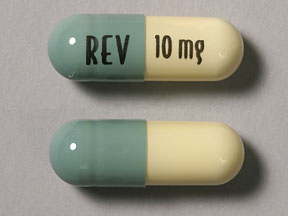Revlimid Disease Interactions
There are 3 disease interactions with Revlimid (lenalidomide).
Lenalidomide (applies to Revlimid) renal impairment
Moderate Potential Hazard, Moderate plausibility. Applicable conditions: Renal Dysfunction
Lenalidomide is primarily excreted unchanged by the kidney. Adjustments to the starting dose are recommended in patients with moderate (CrCl 30-60 mL/min) or severe renal impairment (<30 mL/min), and in patients on dialysis.
Lenalidomide (applies to Revlimid) thromboembolic events
Moderate Potential Hazard, Moderate plausibility. Applicable conditions: History - Thrombotic/Thromboembolic Disorder, Pulmonary Embolism
Venous thromboembolic events (deep venous thrombosis and pulmonary embolism) and arterial thromboses are increased in patients using lenalidomide. Patients with known risk factors such as prior thrombosis, may be at greater risk and actions should be taken to minimize all other modifiable risk factors (e.g., smoking, hyperlipidemia, hypertension).
Miscellaneous antineoplastics (applies to Revlimid) anemia
Moderate Potential Hazard, Moderate plausibility. Applicable conditions: Neutropenia, Thrombocytopenia
Some miscellaneous antineoplastics such as azacitidine and lenalidomide cause anemia, neutropenia, and thrombocytopenia. Patients with these preexisting conditions should be monitored carefully. Monitor complete blood counts frequently for response and/or toxicity, at a minimum, prior to each dosing cycle.
Switch to professional interaction data
Revlimid drug interactions
There are 280 drug interactions with Revlimid (lenalidomide).
More about Revlimid (lenalidomide)
- Revlimid consumer information
- Check interactions
- Compare alternatives
- Pricing & coupons
- Reviews (31)
- Drug images
- Side effects
- Dosage information
- During pregnancy
- Generic availability
- FDA approval history
- Drug class: miscellaneous antineoplastics
- Breastfeeding
- En español
Related treatment guides
Drug Interaction Classification
| Highly clinically significant. Avoid combinations; the risk of the interaction outweighs the benefit. | |
| Moderately clinically significant. Usually avoid combinations; use it only under special circumstances. | |
| Minimally clinically significant. Minimize risk; assess risk and consider an alternative drug, take steps to circumvent the interaction risk and/or institute a monitoring plan. | |
| No interaction information available. |
See also:
Further information
Always consult your healthcare provider to ensure the information displayed on this page applies to your personal circumstances.


